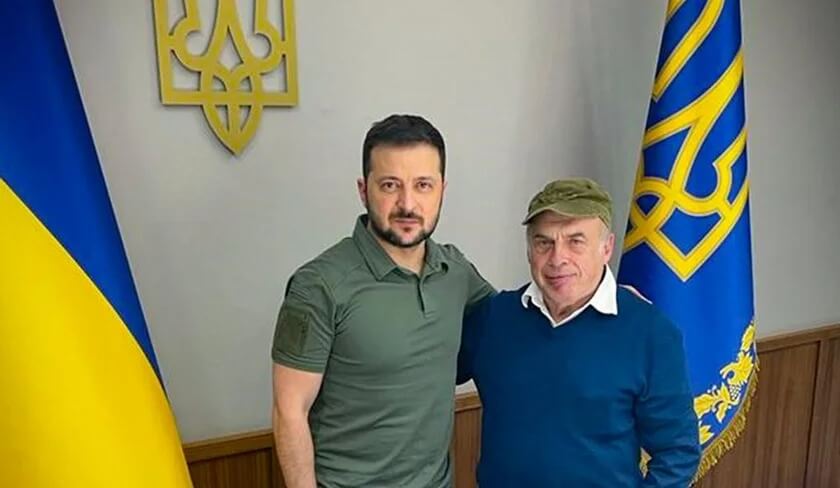Sharansky: Despite the war, there is more hope for Jews in Ukraine than in Russia
More Russian Jews have made aliyah than Ukrainian because there is a ‘feeling that the iron curtain is coming back’ in Russia, said ex-Jewish Agency chief Natan Sharansky

Graphic by Angelie Zaslavsky
This article originally appeared on Haaretz, and was reprinted here with permission. Sign up here to get Haaretz’s free Daily Brief newsletter delivered to your inbox.
The future for Ukrainian Jewry looks much brighter than that of their Russian counterparts, former Jewish Agency chairman Natan Sharansky told Haaretz on Wednesday.
“It’s not accidental” that more Russian Jews than Ukrainian have immigrated to Israel since the beginning of the war, Sharansky said while speaking by phone from Kyiv after meeting with Ukrainian President Volodymyr Zelenskyy on Tuesday.
Sharansky – a former Soviet political prisoner and human rights activist, and who was born in a region of Ukraine now occupied by Russian forces – said that the moral and spiritual connection of Russian Jews to their homeland has been undermined. “Even though it isn’t as physically dangerous as Ukraine”, there is a “feeling that the iron curtain is coming back,” he asserted.
“There is no physical persecution or bombardment in Russia but aliyah goes there very quickly while in Ukraine they destroyed a lot of communities” and many people have been forced to flee abroad “but many of them are coming back.”
Sharansky, who had represented the Kyiv-based Babyn Yar Holocaust Memorial Center at a meeting between Zelenskyy and Jewish leaders —including World Jewish Congress Ronald Lauder and Kyiv’s Chief Rabbi Yaakov Bleich— compared life in contemporary Ukraine to Israel.
“I kept hearing sirens warning of new attacks but people were still attempting to have a normal life,” he said, describing a visit to the Kyiv suburb of Bucha, where Russian forces had engaged in alleged war crimes against Ukrainian civilians. “I only previously saw it in Israel.”
Zelenskyy reiterated comments during the meeting he had made to Haaretz earlier in the week, in which he called on Israel to arm his country in the face of increasing Russian-Iranian cooperation.
“He made a speech very similar to what was said the day before, saying, in a very friendly way, that he doesn’t understand how Israel can try to be neutral in such a clear struggle with evil and with a dictatorship,” Sharansky recalled. “He called it an illusion that Russia can be a partner in fighting Iran.”
According to an official Ukrainian readout of the meeting, Zelenskyy said that “If Israel does not give a clear political assessment of the Russian Federation, new phenomena such as the alliance between Russia and Iran will emerge.”
Zelenskyy also discussed advancing work on a Holocaust memorial at Babyn Yar, where tens of thousands of Jews were killed by the Nazis and their local collaborators within a 48-hour period in 1941.
“We have not forgotten and must implement this project. But for this we have to defend our state today,” Zelenskyy said, according to the readout.













